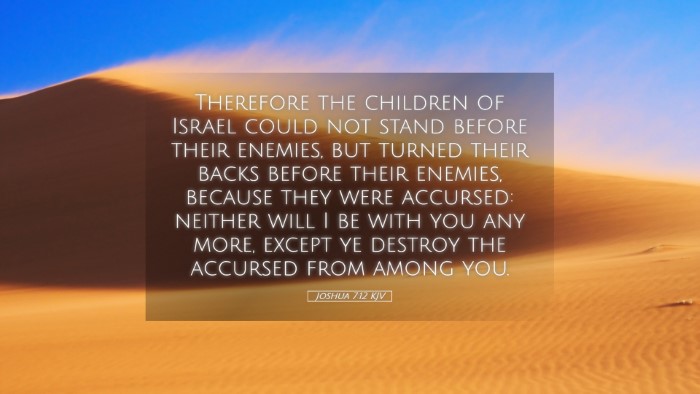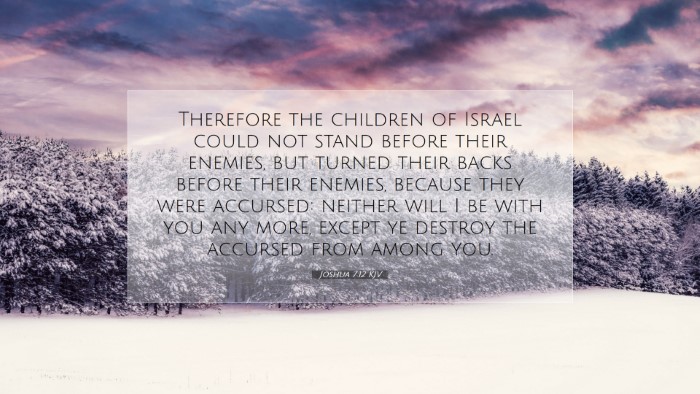Commentary on Joshua 7:12
Text of Joshua 7:12 (KJV): "Therefore the children of Israel could not stand before their enemies, but turned their backs before their enemies, because they were accursed: neither will I be with you any more, except ye destroy the accursed from among you."
Introduction
This verse presents a critical moment in the narrative of Israel’s conquest of Canaan, wherein the disobedience of one individual brings dire consequences upon the entire nation. The context involves the sin of Achan, whose greed led to the violation of God’s command, resulting in Israel's defeat at Ai. Emphasizing collectively the spiritual implications of sin, this commentary draws insights from prominent public domain theologians.
Theological Significance
This text underscores the idea that sin in the camp affects the entire community. Achan’s actions not only endanger his own life but also jeopardize Israel’s standing before God. Matthew Henry comments on this, emphasizing that sin can lead to disastrous consequences not just for the individual, but for the whole congregation.
Matthew Henry’s Insights
- Corporate Consequences: Henry highlights that the unconfessed sin of one can hinder the collective efforts of many. The phrase "the children of Israel could not stand" illustrates that God’s favor is contingent upon the purity of His people.
- God’s Discipline: The verse reflects God’s corrective measures, indicating that He will not accompany them in their endeavors until sin is addressed. The strong language of being "accursed" conveys the gravity of the matter, suggesting a serious breach in their covenant relationship with God.
Albert Barnes’ Perspective
- Spiritual Warfare: Barnes notes that the inability to stand against their enemies is indicative of spiritual warfare. The sin that permitted Achan’s act brought forth divine judgment, making them vulnerable to external threats.
- The Necessity of Purity: He emphasizes that for Israel to secure victory, purity and sanctification were paramount. Barnes articulates that the promise of divine assistance is contingent upon the removal of what is accursed, illustrating a fundamental principle of divine order.
Adam Clarke’s Analysis
- The Nature of the Curse: Clarke elaborates on the "accursed" nature of Achan’s plunder, analyzing its implications on community sanctity. He posits that God's presence can be withdrawn due to the transgression that disrupts the harmonious relationship with Him.
- Call for Action: Clarke believes the directive to “destroy the accursed from among you” serves as an actionable instruction for the Israelites. It signifies the urgency for immediate rectification of sin for restoration and future success.
Practical Applications
This verse invites reflection on both personal and communal aspects of sin. It serves as a reminder for congregations and leaders to prioritize spiritual integrity and accountability.
- Self-Examination: Leaders and believers alike should conduct regular self-examinations to uncover any hidden sins that may hinder their collective mission.
- Community Accountability: There should be encouragement for open dialogue regarding sin and its impact on the community, fostering an environment of support and restoration.
- Preparation for Spiritual Warfare: Acknowledging the reality of spiritual battles, congregations need to be vigilant in maintaining holiness to stand firm against adversities.
Conclusion
Joshua 7:12 serves as a solemn reminder of the consequences of hidden sin, urging followers to pursue righteousness as they seek God’s favor. The insights drawn from Matthew Henry, Albert Barnes, and Adam Clarke collectively emphasize the need for purity to guarantee God’s presence and support in the endeavors of faith. As the Church today strives for effectiveness in mission and outreach, returning to the fundamentals of holiness, community vigilance, and individual accountability remains paramount.


